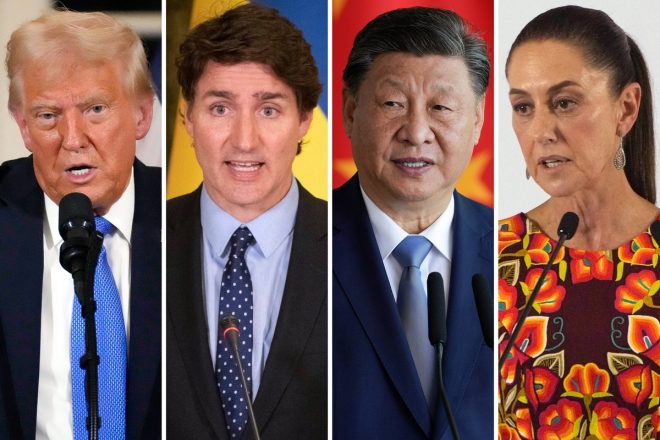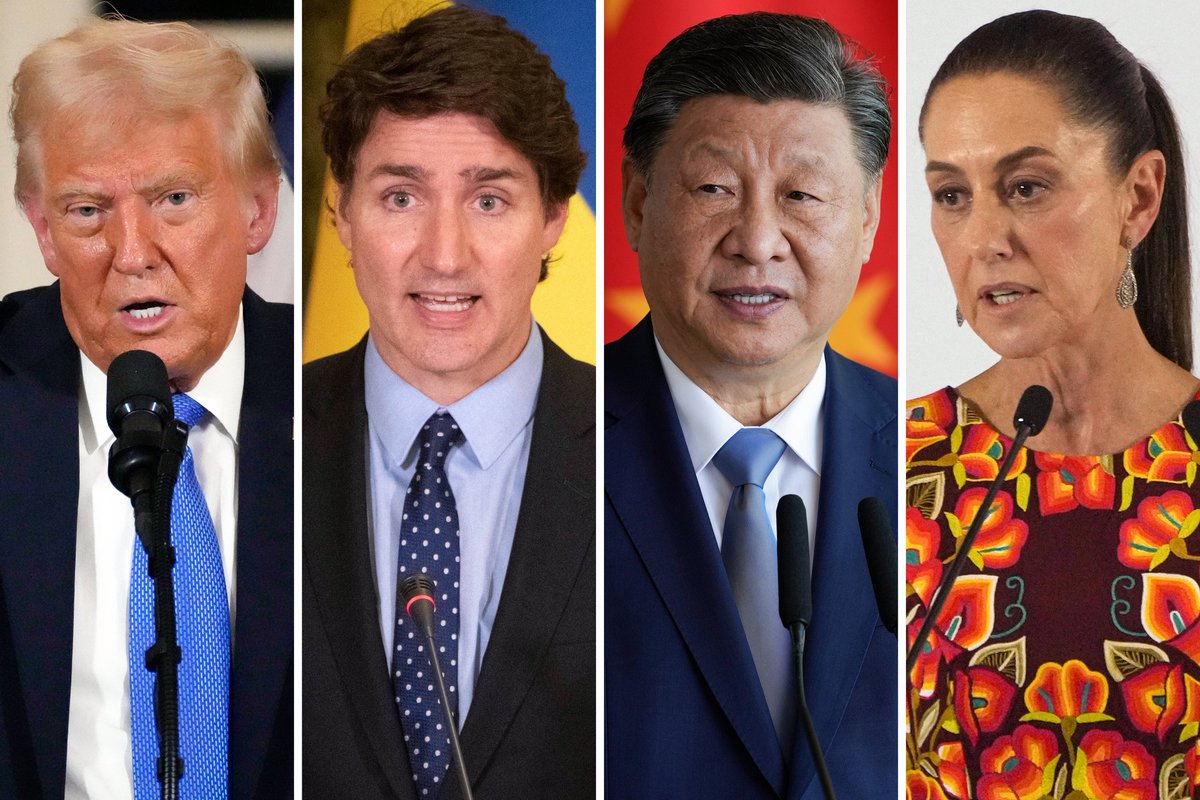
China Imposes 100% Tariff on Canadian Rapeseed Oil, Meal, and Peas: What You Need to Know
In a significant trade development, China has announced the imposition of an additional 100% tariff on Canadian rapeseed oil, rapeseed meal, and peas. This decision has raised eyebrows internationally, particularly among Canadian farmers and exporters who heavily rely on the Chinese market for their goods. In this summary, we will explore the implications of this tariff, the reasons behind China’s actions, and its potential impact on trade relations between Canada and China.
Understanding China’s Tariff Decision
China’s decision to impose a 100% tariff on Canadian agricultural products is part of a broader strategy that appears to be politically motivated. The timing of this move coincides with escalating tensions between the two nations, which have seen a deterioration of diplomatic relations in recent years. The Canadian government’s stance on various issues, including human rights and geopolitical tensions, has led to strained ties with China, prompting retaliatory measures.
Impacts on Canadian Agriculture
The imposition of such a steep tariff is expected to have immediate and far-reaching consequences for Canadian agriculture. Rapeseed oil is an essential commodity for Canada, with a significant portion of its production being exported to international markets, particularly China. The 100% tariff effectively doubles the cost of Canadian rapeseed products in the Chinese market, making them less competitive against other suppliers.
Canadian farmers, particularly in the Prairie Provinces, are likely to experience a downturn in sales as a result. With China being one of the largest importers of Canadian agricultural products, this tariff could lead to a substantial decrease in revenue for farmers who depend on exports. The rapeseed meal, often used as animal feed, may also see a decline in demand, further compounding the economic challenges faced by the agricultural sector.
- YOU MAY ALSO LIKE TO WATCH THIS TRENDING STORY ON YOUTUBE. Waverly Hills Hospital's Horror Story: The Most Haunted Room 502
The Broader Trade Context
This tariff is not an isolated incident but rather part of a series of trade disputes that have characterized Canada-China relations in recent years. In 2020, the two countries engaged in a tit-for-tat trade war that saw Canada facing obstacles in exporting various agricultural commodities to China, including canola oil and pork. The recent tariff on rapeseed oil, meal, and peas can be seen as a continuation of this trend, reflecting ongoing geopolitical tensions.
Why Target Rapeseed Oil and Peas?
The choice of rapeseed oil, rapeseed meal, and peas specifically may be strategic. These products are not only vital to Canada’s agricultural export portfolio but are also crucial for food security and animal feed in China. By targeting these commodities, China sends a clear message to Canada while seeking to minimize the impact on its domestic food supply.
Potential Responses from Canada
In light of this new tariff, the Canadian government is likely to reassess its trade strategy with China. This may involve seeking alternative markets for Canadian agricultural products or negotiating with China to mitigate the effects of the tariff. Canadian agricultural associations are already voicing concerns, calling for government intervention to support farmers affected by these trade barriers.
Moreover, Canada may consider appealing to international trade organizations, such as the World Trade Organization (WTO), to challenge the legality of China’s tariff imposition. This course of action would not only aim to protect Canadian interests but also highlight the importance of adhering to global trade rules.
Looking Ahead: The Future of Canada-China Trade Relations
As the situation unfolds, the future of Canada-China trade relations remains uncertain. The imposition of tariffs often leads to retaliatory measures, further complicating the trade landscape. If tensions continue to escalate, both countries may find themselves entangled in a prolonged trade conflict that could adversely affect various sectors beyond agriculture.
Furthermore, the global economic backdrop, including inflation and supply chain disruptions, adds another layer of complexity to this situation. As countries navigate these challenges, the resilience of the agricultural sector and the ability to adapt to changing market conditions will be tested.
Conclusion
The recent decision by China to impose a 100% tariff on Canadian rapeseed oil, meal, and peas marks a significant escalation in trade tensions between the two nations. As Canada grapples with the immediate impacts on its agricultural sector, the broader implications for trade relations loom large. Stakeholders, including farmers, policymakers, and trade organizations, will need to navigate this challenging landscape carefully, seeking opportunities for dialogue and resolution.
This tariff serves as a reminder of the interconnectedness of global trade and the influence of geopolitical factors on economic relationships. As the situation develops, it will be crucial for all parties involved to engage in constructive dialogue to mitigate the negative impacts and seek pathways toward more stable and beneficial trade relations in the future.
In summary, the 100% tariff on Canadian rapeseed products is not just a financial blow to Canadian farmers but also a significant marker in the evolving dynamics of international trade. Understanding the motivations behind such tariffs and their implications is crucial for stakeholders in both Canada and China as they navigate these turbulent waters.

BREAKING: China has imposed an additional 100% tariff on Canadian rapeseed oil, rapeseed meal, and peas.
Why is China going after Canada? pic.twitter.com/TAOijJCXVx
— TaraBull (@TaraBull808) March 8, 2025
BREAKING: China has imposed an additional 100% tariff on Canadian rapeseed oil, rapeseed meal, and peas
In the ever-shifting landscape of international trade, news like this can send shockwaves across industries and economies. Recently, China announced an additional 100% tariff on Canadian rapeseed oil, rapeseed meal, and peas, leaving many to wonder what led to this drastic decision. Let’s dive into the implications of this move and explore why China is targeting Canada.
Understanding the Tariff Impact
Tariffs are taxes imposed on imported goods, and a 100% tariff effectively doubles the cost of those products in the importing country. For Canadian farmers and exporters, this means that their products will now be significantly more expensive for Chinese buyers, likely leading to a steep decline in exports to one of Canada’s largest trading partners. The agricultural sector, especially those dealing in rapeseed oil and peas, could see major financial repercussions from this decision.
The Canadian agricultural sector has been a significant contributor to the economy, and disruptions in trade can lead to financial instability for producers and related industries. Agriculture and Agri-Food Canada, in a recent report, noted that Canada exports a considerable amount of rapeseed oil to China, making this tariff a particularly painful blow for farmers who rely on these exports for their livelihoods.
Why is China going after Canada?
This question seems to be on everyone’s mind following the announcement. The relationship between Canada and China has been under strain for several years, primarily due to geopolitical tensions. Issues such as the detention of Huawei executive Meng Wanzhou in Canada and Canada’s criticism of China’s human rights record have soured relations. The imposition of these tariffs could be seen as a retaliatory measure by China, targeting Canada’s agricultural market to exert pressure economically.
Additionally, the global agricultural market is highly competitive, with various countries vying for the same consumer base. By targeting Canadian products, China might be aiming to boost its domestic agriculture or to shift its imports to other suppliers. This shift can create a ripple effect in global markets, impacting prices and availability of these commodities worldwide.
The Economic Ripple Effects
The economic implications of this tariff extend beyond just Canada and China. Global supply chains are intricately connected, and disruptions in trade can have far-reaching consequences. With Canada being a major exporter of rapeseed oil and peas, the sudden halt or reduction in exports could lead to increased prices for these products globally.
For consumers, this means that they might see higher prices at the grocery store, especially for products that rely on rapeseed oil. The ripple effects can also hit other countries that import Canadian goods, as they may need to seek new suppliers, which could lead to price fluctuations in the global market.
What’s Next for Canadian Farmers?
Canadian farmers are now left grappling with uncertainty. With the additional tariffs in place, many are questioning how they can sustain their businesses. The Canadian government may need to step in with support measures to help farmers cope with the economic fallout. This support could come in the form of financial aid, subsidies, or initiatives aimed at opening up new markets.
Farmers might also need to pivot their strategies. This could involve diversifying their crops or exploring alternative markets beyond China. Adapting to changing trade landscapes is crucial for resilience in the agricultural sector, and innovation will play a key role in navigating these challenges.
The Bigger Picture in International Trade
This tariff imposition is just one piece of a larger puzzle in international trade. The tension between nations can lead to trade wars, which can destabilize markets and create unpredictable economic environments. Many experts warn that this could be the beginning of a more significant trade conflict between Canada and China, which could have long-lasting effects on both economies.
The need for strategic diplomacy has never been more crucial. Trade agreements and negotiations could help mitigate the impacts of tariffs and foster more cooperative relationships. This situation serves as a reminder of the interconnectedness of global economies and the importance of diplomacy in maintaining stable trade relationships.
Conclusion: A Call for Strategic Adaptation
In conclusion, the recent announcement of a 100% tariff on Canadian rapeseed oil, rapeseed meal, and peas by China is a significant development with wide-ranging implications. The agricultural sector in Canada is poised for a challenging period as it navigates this new reality.
Farmers, policymakers, and industry leaders must come together to explore solutions that can help mitigate the impacts of this tariff. Whether through government support, market diversification, or diplomatic efforts, the goal should be to ensure a resilient agricultural sector that can withstand the pressures of international trade dynamics.
Staying informed about these developments and understanding the broader implications of international trade decisions like this one is essential for anyone invested in the agricultural industry or simply interested in global economics. The situation is evolving, and it will be interesting to see how both countries respond in the coming months.
